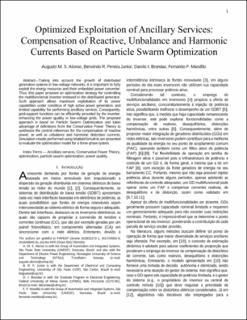| dc.contributor.author | Dos Santos Alonso, Augusto Matheus | |
| dc.contributor.author | Rodrigues Pereira Jr., Benvindo | |
| dc.contributor.author | Brandao, Danilo Iglesias | |
| dc.contributor.author | Marafao, Fernando Pinhabel | |
| dc.date.accessioned | 2021-09-30T08:20:23Z | |
| dc.date.available | 2021-09-30T08:20:23Z | |
| dc.date.created | 2021-03-12T13:05:54Z | |
| dc.date.issued | 2021 | |
| dc.identifier.citation | IEEE Latin America Transactions. 2021, 19 314-325. | en_US |
| dc.identifier.issn | 1548-0992 | |
| dc.identifier.uri | https://hdl.handle.net/11250/2786474 | |
| dc.description.abstract | Taking into account the growth of distributed generation systems in low-voltage networks, it is important to fully exploit the energy resources and their embedded power converter. Thus, this paper proposes an optimization strategy for controlling the multifunctional inverter endowed in the distributed generator. Such approach allows maximum exploitation of its power capabilities under condition of high active power generation, and limited capability for performing ancillary services. Consequently, grid-support functions can be efficiently provided by the inverter, enhancing the power quality in low-voltage grids. The proposed approach is based on Particle Swarm Optimization and takes advantage of definitions from the Conservative Power Theory to synthesize the control references for the compensation of reactive power, as well as unbalance and harmonic distortion currents. Simulation results performed using Matlab/Simulink are presented to evaluate the optimization model for a three-phase system. | en_US |
| dc.language.iso | eng | en_US |
| dc.publisher | Institute of Electrical and Electronics Engineers (IEEE) | en_US |
| dc.relation.uri | https://latamt.ieeer9.org/index.php/transactions/article/view/3264 | |
| dc.title | Optimized Exploitation of Ancillary Services: Compensation of Reactive, Unbalance and Harmonic Currents Based on Particle Swarm Optimization | en_US |
| dc.type | Peer reviewed | en_US |
| dc.type | Journal article | en_US |
| dc.description.version | acceptedVersion | en_US |
| dc.rights.holder | © IEEE. Personal use of this material is permitted. Permission from IEEE must be obtained for all other uses, in any current or future media, including reprinting/republishing this material for advertising or promotional purposes, creating new collective works, for resale or redistribution to servers or lists, or reuse of any copyrighted component of this work in other works. | en_US |
| dc.source.pagenumber | 314-325 | en_US |
| dc.source.volume | 19 | en_US |
| dc.source.journal | IEEE Latin America Transactions | en_US |
| dc.identifier.cristin | 1897658 | |
| dc.relation.project | Norges forskningsråd: 261735 | en_US |
| cristin.ispublished | true | |
| cristin.fulltext | preprint | |
| cristin.qualitycode | 1 | |
